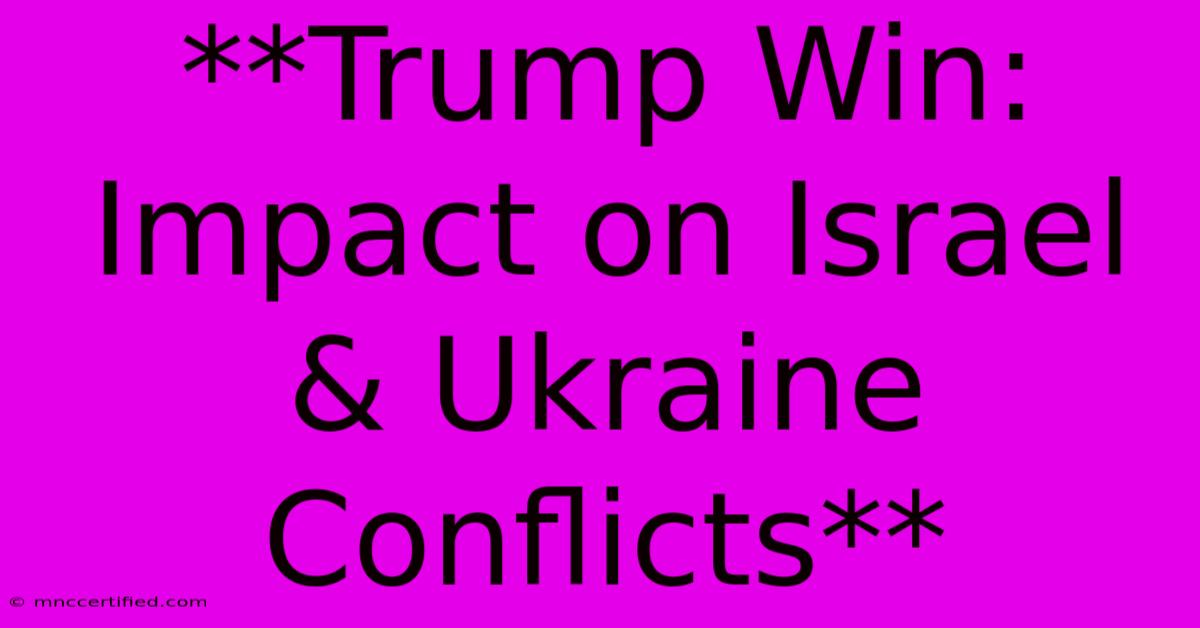**Trump Win: Impact On Israel & Ukraine Conflicts**

Table of Contents
Trump Win: Impact on Israel & Ukraine Conflicts
The potential impact of a Donald Trump victory in the 2024 US presidential election on the ongoing conflicts in Israel and Ukraine is a subject of intense speculation and debate. Trump's past stances and actions on these issues offer some insights into his potential approach, but the complexity of both conflicts and the shifting international landscape make any prediction uncertain.
Trump's History with Israel
Trump has consistently expressed strong support for Israel, moving the US embassy to Jerusalem, recognizing Israeli sovereignty over the Golan Heights, and brokering normalization agreements between Israel and several Arab countries. His approach to the Israeli-Palestinian conflict has been characterized by a focus on security and peace deals, often bypassing traditional diplomatic channels.
Potential Implications:
- Increased Support for Israel: A Trump presidency could see even stronger support for Israel, potentially including increased military aid and a more assertive stance against Palestinian actions.
- Focus on Direct Negotiations: Trump might favor a direct negotiation approach between Israel and Palestine, potentially bypassing the traditional role of the Palestinian Authority.
- Shift in US Policy: Trump's previous focus on security over rights could lead to a change in US policy towards the Palestinians, potentially lessening pressure on Israel regarding settlements and human rights concerns.
Trump's Stance on Ukraine
Trump's position on the Russia-Ukraine war has been less consistent. While he initially expressed support for Ukraine's territorial integrity, he has also made statements questioning US involvement and praising Russian President Vladimir Putin.
Potential Implications:
- Reduced US Support: Trump has been criticized for his stance on Ukraine and his relationship with Putin. A Trump victory could potentially lead to a decrease in US military and financial aid to Ukraine.
- Negotiations with Russia: Trump might prioritize diplomatic negotiations with Russia, potentially at the expense of Ukrainian interests. This could lead to concessions on Ukrainian sovereignty and a shift in the US's overall strategy in the conflict.
- Re-evaluation of NATO: Trump has previously questioned the value of NATO and expressed concerns about US financial contributions. He may seek to renegotiate NATO agreements or even withdraw the US from the alliance, potentially impacting the defense of Ukraine and other Eastern European nations.
Key Considerations
It's important to note several key factors that could influence Trump's approach:
- Domestic Politics: The 2024 election will likely be closely contested, and Trump's stance on both conflicts might be influenced by domestic political considerations.
- International Pressure: Trump's foreign policy decisions would likely be influenced by the actions of allies and adversaries.
- Shifting Landscape: The conflicts in both Israel and Ukraine are dynamic, and the international context may evolve significantly between now and 2024.
Conclusion:
Predicting the precise impact of a Trump victory on the Israeli and Ukrainian conflicts is difficult. However, analyzing his previous positions and statements provides insight into his potential approach. His strong support for Israel could lead to an even more pro-Israel US policy, while his stance on Ukraine remains uncertain and could potentially lead to reduced US involvement and a shift towards negotiation with Russia. The complex geopolitical landscape, domestic pressures, and the ongoing evolution of these conflicts will ultimately shape Trump's actions if he were to win the 2024 election.

Thank you for visiting our website wich cover about **Trump Win: Impact On Israel & Ukraine Conflicts**. We hope the information provided has been useful to you. Feel free to contact us if you have any questions or need further assistance. See you next time and dont miss to bookmark.
Featured Posts
-
Sf Mayor Race Update Breed Trails
Nov 07, 2024
-
Sleigh Hill Trading Company Wrapping Paper
Nov 07, 2024
-
How Much Is An Ob Gyn Visit With Insurance
Nov 07, 2024
-
Bayern Vs Benfica Starting Lineups Revealed
Nov 07, 2024
-
Campus Resources University Prioritizes Wellbeing
Nov 07, 2024